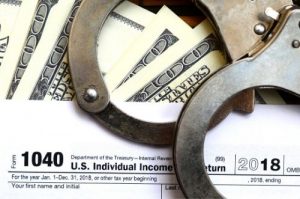Tax fraud is a crime, which if not detected and dealt with can result in heavy tax penalties being levied on the offender. These tax fraud penalties can range from large fines to jail time and in some cases liens on one’s assets can also be imposed. Tax fraud can take many forms and there are various ways in which an offender can be charged for tax fraud. Some tax crimes include: filing false tax returns, willfully filing false tax claims, using the dead tax return as security for another tax debt, filing improper tax returns, using a tax coupon or a tax refund address stamp to avoid tax liability, using an unauthorized tax refund advance and any state tax refund liens.

Because tax fraud is such a vast field of crime, many different types of crimes can fall under this broad heading. Criminal tax fraud penalties can include jail time, heavy fines and in some cases, even heavier penalties. If your tax evasion conviction triggers jail time, you may be required to pay the remainder of your tax debt immediately and for a long time. In extreme cases, tax fraud can lead to irreparable harm to your ability to obtain credit and can result in substantial loss of property and possibly even freedom.
It is always important to be fully aware of the tax fraud penalties that are available to you when you are under investigation. For instance, one of the most serious tax fraud penalties that you could be faced with relates to statements that are false or misleading. Any statement that is willfully misleading can potentially land you in hot water. If you have instructed a driver to use a particular address for tax purposes, when it is known that this address is actually a tax fraud destination, this is seen as a false statement on your tax return. In this instance, you could be sentenced to jail time, fines, and even criminal charges. As a careful taxpayer, it is important to ensure that you do not make any false statements on your tax return.
The penalties associated with the various tax crimes can also be classified based on whether the conviction was state or federal. Federal tax crimes include such major offenses as tax evasion, perjury, conspiracy, tax fraud, asset forfeiture, and bankruptcy. Many states have harsher criminal penalties associated with federal tax crimes, but a state conviction can still land you in jail time. Some states offer early parole statutes which allow federal tax fraud offenders to serve time behind bars prior to applying for pardon or release from jail.
Once you have been charged with a tax fraud crime, it is important to seek the representation of a tax fraud lawyer. You will find that most criminal charges carry very significant fines and potential jail time. Even in instances where the fines are minimal, having representation on your side can make a huge difference in the outcome of your case. A tax fraud lawyer can negotiate with the IRS to achieve the most advantageous resolution for you, said an IRS audit lawyer in New Jersey. They will also be able to help you navigate the complex tax laws so that you can maximize the tax deductions you’re eligible to take. In many cases, expert tax lawyers can represent you through the appeals process and can also represent you in court if the prosecution choose to go that route.
As you can see, there can be many consequences associated with willfully avoiding your obligations. Many times, a simple payment agreement or an education program may be all that’s needed to avoid jail time and hefty fines. However, in some cases, criminal charges are necessary to prove that you were willfully negligent in your financial affairs. If this is the case, it’s important to hire a tax fraud attorney who can help secure your innocence and get you through the toughest legal situation possible.
 Tax fraud is extremely complicated and the penalties for tax evasion and criminal tax investigation can be very severe. Serious tax crimes carry criminal tax evasion charges, while simple tax fraud might only result in financial penalties or a fine. In some cases, criminal tax investigations may result in prison time. The IRS (Internal Revenue Service) and its tax fraud investigators are constantly looking for new ways to cracking down on tax cheats. Recently, the IRS has developed a new tool, known as the tax fraud audit planner, which can help taxpayers with tax fraud and evasion cases.
Tax fraud is extremely complicated and the penalties for tax evasion and criminal tax investigation can be very severe. Serious tax crimes carry criminal tax evasion charges, while simple tax fraud might only result in financial penalties or a fine. In some cases, criminal tax investigations may result in prison time. The IRS (Internal Revenue Service) and its tax fraud investigators are constantly looking for new ways to cracking down on tax cheats. Recently, the IRS has developed a new tool, known as the tax fraud audit planner, which can help taxpayers with tax fraud and evasion cases. Unfortunately, in some instances an innocent taxpayer will be prosecuted for tax fraud and/or tax evasion. The majority of federal tax crimes are committed through payroll deductions, asset tax fraud, and tax avoidance schemes. Other crimes include: asset tax evasion, misrepresentation of income and expenses, false statements, non-filing of tax returns, tax haven accounts, tax evasion, tax fraud and money laundering. Some state tax crimes include: tax evasion, misrepresentation of assets and liabilities, tax crimes and fraudulently calculating income and expenses.
Unfortunately, in some instances an innocent taxpayer will be prosecuted for tax fraud and/or tax evasion. The majority of federal tax crimes are committed through payroll deductions, asset tax fraud, and tax avoidance schemes. Other crimes include: asset tax evasion, misrepresentation of income and expenses, false statements, non-filing of tax returns, tax haven accounts, tax evasion, tax fraud and money laundering. Some state tax crimes include: tax evasion, misrepresentation of assets and liabilities, tax crimes and fraudulently calculating income and expenses.